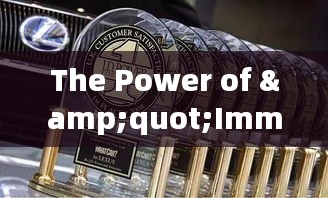The Power of "Immediately" in the English Language
In the fast-paced world we live in, the word "immediately" holds significant importance. As a word that denotes immediacy and urgency, it plays a crucial role in various contexts, from daily communication to professional settings. This article delves into the uses and nuances of the adverb "immediately" in the English language, exploring its impact on communication and its role in shaping the way we perceive time and actions.
Understanding the Adverb "Immediately"
The adverb "immediately" is used to describe actions that happen without any delay or delay. It is derived from the Latin word "immediate," which means "without a middle." This word is often used to emphasize the speed or urgency of an action or event. In English, "immediately" is a versatile adverb that can be used in various sentence structures.
Common Uses of "Immediately" in Sentences
One of the most common uses of "immediately" is in the present simple tense. For example, "I will leave immediately" indicates that the action of leaving will happen without any delay. Similarly, in the past simple tense, "She called me immediately" suggests that the calling action occurred without any delay after the previous event.
In the future simple tense, "We will start the meeting immediately" conveys the idea that the meeting will begin without any delay. This use of "immediately" is particularly effective in professional settings, where promptness is often valued.
Emphasizing Urgency
"Immediately" is a powerful tool for emphasizing urgency. For instance, in a medical emergency, the word "immediately" can be used to convey the critical need for action. "The patient needs medical attention immediately" is a clear call to action, highlighting the urgency of the situation.
In a business context, "immediately" can be used to express the need for a quick response. "Please respond to this email immediately" indicates that the sender expects a prompt reply, emphasizing the importance of the matter.
Shaping Perceptions of Time
The use of "immediately" can also shape the way we perceive time. By emphasizing the lack of delay, it can create a sense of urgency and importance. For example, when a teacher says, "The test will begin immediately," students are likely to perceive the test as a high-priority event, which can affect their preparation and focus.
Similarly, in personal relationships, "immediately" can be used to convey the importance of a moment or event. "I will be there immediately" can reassure a loved one, indicating that the speaker is prioritizing their presence and care.
Alternatives and Nuances
While "immediately" is a strong word for expressing immediacy, there are alternatives that can be used in different contexts. Words like "instantly," "promptly," and "right away" can also convey a sense of urgency, but with slight nuances. "Instantly" emphasizes the speed of an action, "promptly" suggests a quick response, and "right away" implies an immediate start to an action.
It is important to choose the right word based on the context and the tone you wish to convey. For example, "I will respond to your email promptly" suggests a professional and responsible approach, while "I will respond to your email immediately" might be perceived as more demanding or urgent.
Conclusion
In conclusion, the adverb "immediately" is a powerful tool in the English language, capable of conveying urgency, shaping perceptions of time, and emphasizing the importance of actions. Its versatility allows it to be used in a wide range of contexts, from daily conversations to professional settings. By understanding the nuances and alternatives, we can effectively use "immediately" to enhance our communication and convey our intended message.
Navigating the Art of Writing "Real-Time Progress" in English
"Do Not Go Gentle into That Good Night" by Dylan Thomas: A Timeless Call to Arms
Navigating the English Language Trending Topics Chart: A Comprehensive Guide
Unlocking the Power of Real-Time Events: Engaging Audiences in the Moment
The Rise and Fall of Hot Products: Understanding the Ephemeral Trend in Consumer Goods
Summer's Hottest Foods: A Culinary Journey Through the Warmest Months
The Battle of the Viral Hits: English Versions of Douyin's Popular Songs
The Rise of Electric Vehicles: A Game-Changer in the Automotive Industry












 蜀ICP备08106559号-1
蜀ICP备08106559号-1